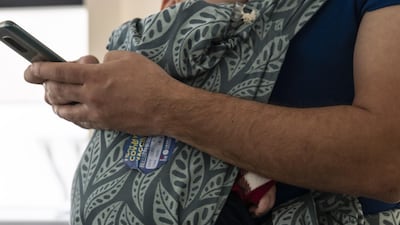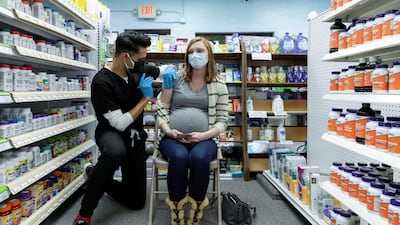Expectant mothers in Dubai discuss their concerns about being pregnant during a pandemic.
As new coronavirus cases continue to hover around 3,000 a day, they are worried about their health and the well-being of their unborn babies.
One study published in the British Medical Journal in September indicated that pregnant women who contracted Covid-19 were more likely to need admission to an intensive care unit and need ventilation, compared with non-pregnant women of similar age.
Women cannot be vaccinated while pregnant or breastfeeding, in accordance with UAE regulations, leaving many feeling particularly vulnerable as the authorities battle to contain the virus.
Faye Goss is six months pregnant with her third child and said her concerns have increased as case numbers surged in the UAE.
“I have two young children in school, and that feels like a high-risk environment at the moment.
“I feel like a sitting duck because I can’t have the vaccine, and when you're pregnant you have a suppressed immune system. If I were to catch it, I would worry about what medication I could take.”
The odds of giving birth prematurely are also higher in women suffering from or who have recently been infected with coronavirus.
Moreover, expectant mothers and postpartum mothers who are older, overweight, and have pre-existing medical conditions such as hypertension and diabetes appear to have an increased risk of developing severe Covid-19, according to the World Health Organisation.
Doctor's orders
Medical experts in the UAE warn pregnant women to take all the normal precautions to protect themselves against coronavirus, and report possible symptoms – including fever, cough or difficulty in breathing – to their healthcare provider.
Rachel Dowes, 38, tested positive for Covid-19 when she was three months pregnant, but remained asymptomatic throughout her quarantine.
The qualified hypnotherapist works in women's wellness, and stopped seeing clients face to face because she was worried about catching the virus.
After the diagnosis, her obstetrician was reassuring.
"She said it's more risky later on because there's a risk of preterm labour," Ms Dowes said.
"To get it in the first couple of trimesters is actually a good thing, because you'll build up immunity, and hopefully the baby will also have immunity."
Ms Goss also sought advice from her obstetrician about her Covid concerns.
“She advised a high degree of caution, but equally she said I should try to have a normal life as much as possible, because one's mental health is also important while pregnant," she said.
“The evidence seems to suggest that the baby shouldn't suffer, even if the pregnant mother is really unwell with Covid-19, but given the uncertainty of how different individuals respond to the virus, I am worried."
Post-natal depression in a pandemic

Experts fear the worry of being pregnant and catching Covid-19 could lead to mental health problems. Julie Mallon, a British midwife and certified sleep consultant at Babies and Beyond in Dubai, which provides services to parents, noted an alarming rise in depression among new mothers since the start of the pandemic.
"They are much more anxious and scared during pregnancy. My concern is whether this will affect how mothers bond with their babies.
"A big problem is social isolation, where women don’t feel they can get the support they need because they need to keep safe and isolate.
"There is also a shame and stigma felt by mothers who have caught Covid-19, or whose babies have got unwell. They feel guilty, and that affects their mental health."
Laura-Ann Yuille, who is nine months pregnant, is only just starting to feel concerned.
“I’m almost glad that I’ve been pregnant during the pandemic, I’ve felt safe enough in the UAE to go to restaurants and to keep going to the gym," she said.
“But now the baby is due, I’ve just started to worry about protecting him.”
Pregnancy and the Covid-19 vaccine

Nursing mothers, pregnant women and children are not allowed to receive any of the vaccines available in the UAE, but Aysha Awwad, 40, who is four months pregnant with her first child, said she would take the jab “without hesitation” if it was allowed.
A first-time mother from the UK, Ms Awwad is worried about giving birth and protecting her newborn.
“I feel like going into hospital, and then coming out of hospital – our movements will be restricted, because there's still going to be the risk of contracting Covid-19," she said.
“It's a bit daunting, and it's only starting to dawn on me now, that because of the travel restrictions, maybe my mum won't be able to be there for the birth. I think that's probably the most daunting aspect, but I still don't regret being pregnant now.”
It is still not known if a pregnant woman with Covid-19 can pass the virus to her foetus or baby during pregnancy or delivery. To date, the World Health Organisation reports that the active virus has not been found in samples of fluid around the baby in the womb or breastmilk.
Ms Yuille, 40 is due to give birth to her second child in the next few days.
“I’ll be a lot more careful about who I let visit, and I’ll be strict about who I see," she said.
"I have heard of really little babies getting Covid, and we just don’t know about the long-term impact on their respiratory system.
“I can’t get the vaccine yet, but when I stop breastfeeding I will. But you can’t live your life constantly worrying, I need to crack on.”
Ms Goss also wishes she could take a coronavirus vaccine.
“I did think as soon as I've given birth I can have the jab straight away," she said.
"But I understand that there's not a lot of data and evidence around how the vaccine would affect mothers who want to breastfeed.
“I don't really know how vulnerable a baby is to coronavirus. I think there's quite limited data. So there's a lot of uncertainty right through the pregnancy, the birth, and for a few months thereafter, if you wish to be feeding your child.”





















